Curious about CBD oil but feel overwhelmed by the flood of information out there? You’re not alone. This guide cuts through the confusion to explain exactly what CBD oil is, how it works, and why so many Australians swear by it.
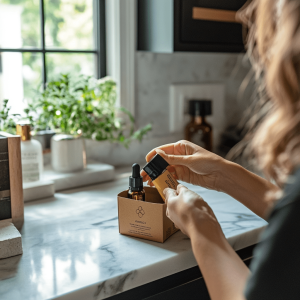
We’ll cover:
- What CBD oil actually is and its origin
- How CBD interacts with your body
- Common reasons people use CBD oil
- Legal status and how to get CBD oil in Australia
- Clarifying why CBD won’t get you “high”
Why does learning these fundamentals matter? CBD oil is now legal to buy in Australia. You can now purchase these products over the counter in pharmacies, online or at specialist retail stores (like dispensaries).
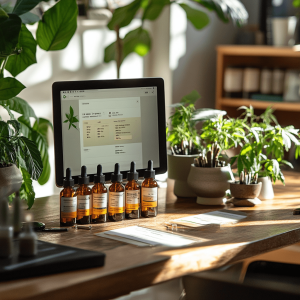
Many people still misunderstand CBD oil. They often confuse it with:
- Cannabis oil
- Hemp oil (made from hemp seeds)
- CB2 Oil
However, CBD oil is an entirely separate product category.

This guide equips you with the knowledge to confidently understand, assess, buy and use CBD oil.
Let’s unpack everything you need to know
Contents
What is CBD Oil?
CBD oil is a natural health product. Producers extract it from the cannabis sativa plant (hemp) and diffuse it into a liquid carrier oil like MCT. This is to improve its absorption when consumed.
The oil typically appears as a golden to dark green liquid, depending on the extraction method and carrier oil used. Its texture is smooth and slightly viscous. The taste profile of CBD oil can range from earthy or grassy (especially for full-spectrum oils) to neutral or somewhat nutty if refined or mixed with MCT oil.
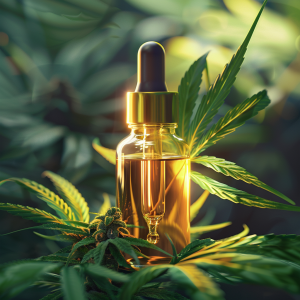
In Australia, sellers usually package CBD oil in 15–30ml tinted glass dropper bottles to protect it from light.
The dropper’s purpose is to make dosing easier. Labels on the bottle will show potency (e.g. 1000mg CBD). Packaged CBD oil products should also provide usage instructions, and indicate whether the formulation is full-spectrum, broad-spectrum, or isolate.
What do the letters ‘CBD‘ stand for? They abbreviate ‘cannabidiol,’ a cannabinoid compound the hemp plant secretes.
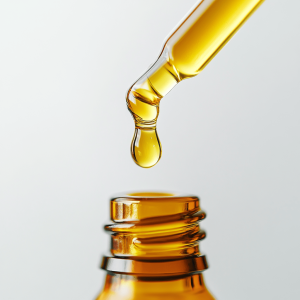
Cannabinoids are a unique group of bioavailable (usable by the body) chemical compounds that each have varying effects and benefits.
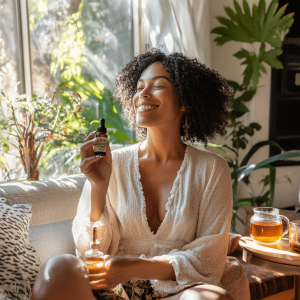
Most users take CBD oil sublingually (under the tongue) to feel its effects quickly. However, you can also ingest it (eat the oil) or apply it to your skin for topical use.
What’s the Difference Between CBD, Cannabis and Hemp Oil?
People often mix up different oil products sourced from cannabis sativa.
But don’t confuse them. Each is entirely different:
- CBD Oil contains CBD in varying concentrations but almost no THC (under 0.3% concentration in Australia). It can’t intoxicate you.
- Cannabis oil contains THC (and often CBD). It’s a prescription product that causes a euphoric ‘high’ effect.
- Hemp oil is produced from cold-pressed hemp seeds. These don’t contain any cannabinoids. As such, hemp oil is only helpful for dietary or skin health purposes.
- CB2 oil is a marketing term commonly used in Australia and other regions to refer to hemp-derived CBD oil, especially when sold online.
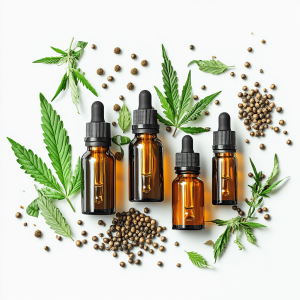
Keep these differences in mind when you’re shopping for CBD oil in Australia to avoid wasting your money or time. CB2, CBD, cannabis and hemp oil are not the same thing.
Ensure your product says “CBD” or “cannabidiol” on the label.
Where is CBD Oil From?
Manufacturers extract all types of CBD products, including oils and tinctures, from industrial hemp or cannabis plants.
There are several ways to do this: CO2 extraction (the gold standard approach), ethanol extraction, or cold pressing.
No matter the method, producers always need to prepare hemp plants before extraction.

Quality CBD oil production involves several key steps:
- Harvesting and drying hemp plants.
- Separating and processing buds and leaves into resin.
- Extraction using techniques like CO₂ (considered best practice), ethanol, or cold pressing.
- Refining and mixing pure CBD extract into carrier oils for consumer-ready products.
Once they obtain pure CBD, manufacturers mix it with a carrier oil to create the final CBD oil end-product.
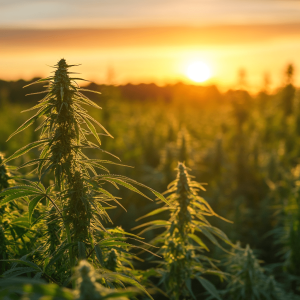
Pharmaceutical CBD oil suppliers in Australia import most prescription-grade oil products, typically from the US or the UK.
However, local production for pharmaceutical-grade formulations is growing. Reputable manufacturers use lab testing to ensure purity and comply with GMP (Good Manufacturing Practice) standards.
What Does CBD Oil Do?
CBD doesn’t “cure” health conditions outright but instead supports your body’s natural balance.

Here’s how it happens:
After ingesting CBD, your body absorbs it into the blood. Molecules of CBD then activate your body’s naturally occurring cannabinoid receptors.
The cannabinoid receptor network is part of the endocannabinoid system, including the brain, nervous, and immune systems. It functions as a supportive feedback loop that promotes chemical balance (homeostasis).
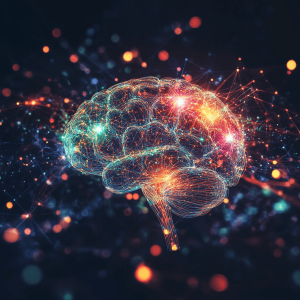
Once activated, cannabinoid receptors release endogenous cannabinoids (or ‘endocannabinoids’), which stimulate effects like:
- Soothing anxiety and calming stress
- Lowered inflammation around the body
- Supporting sleep health
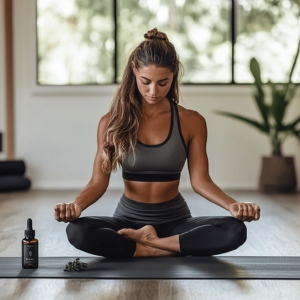
Additionally, CBD helps you maintain a more grounded, calm, and balanced mental state.
Why Do People Use It?
People use CBD oil to improve their overall physical and mental health. The reasons people use CBD oil vary significantly.
People can take it as a general-purpose wellbeing aid or use it to relieve or manage specific health issues.
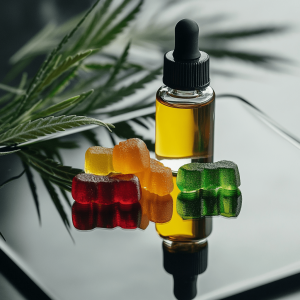
Here are some of the most common purposes you might use CBD oil for:
- Balanced mood and focus: CBD tends to help holistically with mental energy, mood stability, and focus. Even if you’re already healthy, CBD can be a great addition to your daily stack for simply feeling and performing better.
- Enhanced athletic recovery: Athletes favour CBD oil to assist with sports recovery, sleep depth, and exercise performance. It’s excellent at soothing muscle aches, strains, or inflammation from strenuous training regimens.
- Better Sleep: Another widespread use of CBD extracts is getting better, deeper sleep. Taking advantage of its calming, stress-alleviating powers at night is ideal for preventing insomnia. CBD also has proven advantages for balancing circadian rhythm and sleep-wake cycles.
- Calming anxiety: studies have shown CBD has anxiolytic or anxiety-lowering properties. This makes it well-suited to soothing a nervous mind and preventing racing thoughts.
- Mild pain relief: CBD isn’t a painkiller. However, many users find that it alleviates the degree of certain pain types. It’s specifically helpful for neuropathic (nerve) pain. Why? It alters nerve signalling, which lowers the ‘amount’ or intensity of pain felt.
- Inflammation and immunity: Because it interacts with the immune system, CBD can help normalise immune function. This matters because inflammation stems from immune dysregulation. That’s why people use CBD to manage inflammatory conditions like IBS, colitis, or rheumatoid arthritis.
Remember that CBD’s effects and usefulness tend to vary widely between individuals. Much of this stems from the differences between users in what they’re taking it for. Now that you know why you might use CBD oil, let’s cover how to get it.
How Do You Get CBD Oil in Australia?
There are a few ways to get CBD oil in Australia today.
Each of these varies depending on what type of CBD oil product you’re looking for.
Although CBD is now legal in Australia, the government still restricts access to specific formulations.
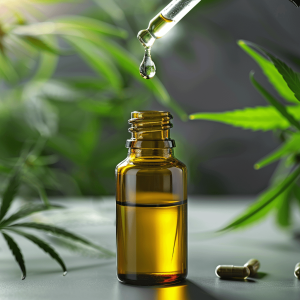
Access to CBD oil varies depending on product strength and THC content:
- ‘Low-dose’ CBD oil can be purchased today without a doctor’s prescription. This type of product must contain under 150mg of daily CBD dosage equivalent and can only contain 30 mL of oil per dropper bottle in pharmacies over the counter. Today, you can even find it in many retail stores (plus CBD shops online).
- High-strength CBD oil is prescription-only (classed as a cannabis medication). Any tincture containing more than 150mg CBD daily for a 30 mL bottle falls under this category. You’ll need a GP’s approval and a prescription to buy these.
- CBD oil with THC is even more strictly controlled. Why? THC can get you high and carries significant risks if misused or prescribed incorrectly. CBD products containing it are mostly provided to patients for pain relief or specific medical conditions.
Chances are you won’t need a highly concentrated CBD tincture or one that contains THC.

Most people find that low-dose oils work best for their needs.
If you have a specific condition you want to treat with CBD, you need to speak to your doctor. CBD is often completely unnecessary, and your GP will be able to judge whether it’s an option at all for you.
Will CBD Get Me High?
There’s no way that CBD oil can intoxicate you (get you ‘high’) as it contains no THC. CBD differs from the THC (delta-9-tetrahydrocannabinol) cannabinoid, which causes a ‘high’. THC is psychotropic and psychoactive. Why?
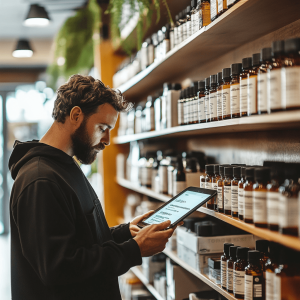
THC strongly activates CB1 cannabinoid receptors in the brain, which then alters the regulation of neurotransmitters like dopamine. In turn, you experience altered consciousness and euphoria.
CBD doesn’t stimulate CB1 cannabinoid receptors in the same way. It’s completely non-intoxicating and much safer in comparison.
If you still worry about THC risks, choose a CBD isolate or broad-spectrum oil. These formulations have 0% THC.
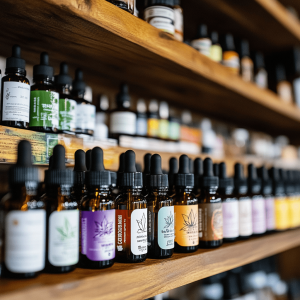
Full-spectrum CBD oil, on the other hand, is riskier. Why? It’s less processed. This means it will still retain tiny amounts of THC (below 0.3%). Although this amount of THC won’t affect your mental state, drug tests can still detect it. Keep that in mind if your job requires drug testing or if you drive in Australia, where roadside drug testing applies.
Regardless of which type you choose – verifying THC concentrations with lab reports is always wise.
Conclusion
By now, you should have a deep understanding of CBD oil, its benefits, limitations, and common uses.

Let’s recap what we’ve explored. We delved into:
- Whether CBD oil gets you high (it doesn’t and is non-intoxicating)
- What CBD oil is (a natural health aid)
- Where it comes from (extracted from hemp plants)
- How CBD works (via the endocannabinoid system)
- Why people use it (to help improve wellbeing)
- How to get CBD oil in Australia (depending on which formulation you need)
Fundamentally, CBD oil offers a non-intoxicating option to support better health, recovery and mental state without side effects. Plus, it’s easy to use and incorporate into your routine.
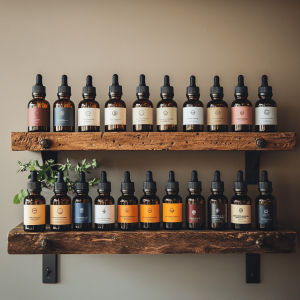
Remember that high-strength CBD extracts or those that contain THC need a prescription to purchase.
As access expands, understanding the nuances of CBD products will empower you to make informed decisions tailored to your unique needs. The next step is up to you. CBD oil can be a powerful tool to support your journey towards better health, but you need to assess what’s right for your situation and body.
Always discuss your individual circumstances with your healthcare provider before beginning your CBD journey.
FAQs
The main ingredient of CBD oil is the cannabidiol (CBD) cannabinoid from hemp. However, it also contains a blend of other phytocompounds (chemicals from plants) from hemp. These include terpenes, antioxidative compounds, vitamins, minerals, fats (polyunsaturated fatty acids) and cannflavins (a flavonoid).
Not quite. People often use the terms interchangeably, but this isn’t accurate. CBD oil comes infused in a carrier oil like hemp seed or MCT oil. Tinctures, in contrast, will contain an alcohol base. Both deliver CBD but differ in base ingredients, taste, and shelf life.
Hemp oil and CBD oil are different. Producers source hemp oil from hemp seeds, which contain no cannabinoids like CBD, while they extract CBD oil from the buds and leaves of the hemp plant. These parts of the plant are rich in cannabinoids. As such, the oil extracted from them will have a high CBD content. These chemical differences lead people to use CBD oil and hemp oil for distinct purposes. Most use hemp oil for cooking, while they consume CBD oil therapeutically to promote health or wellbeing.
Marijuana is a slang term for cannabis sativa strains that contain high THC concentrations. These plants will also contain CBD in varying amounts. Although marijuana contains CBD, Australian producers don’t source CBD oil from those strains. Producers source it from THC-free industrial hemp varieties or specially cultivated high-CBD hemp strains that secrete very little THC.
People most commonly use CBD oil to reduce anxiety and alleviate stress without experiencing intoxication. Some people also favour CBD to relieve mild pain or inflammation, improve sleep, accelerate exercise recovery, or promote mood.
Research has proven CBD oil’s health benefits. Scientific evidence on its efficacy is extensive but varies depending on the clinical use case. For example, CBD proves highly effective at preventing and minimising seizures, which is why doctors use it in seizure medications. Whether it works for you depends on an assessment from your doctor. Results from CBD tend to be highly variable, and it isn’t a cure for anything.
